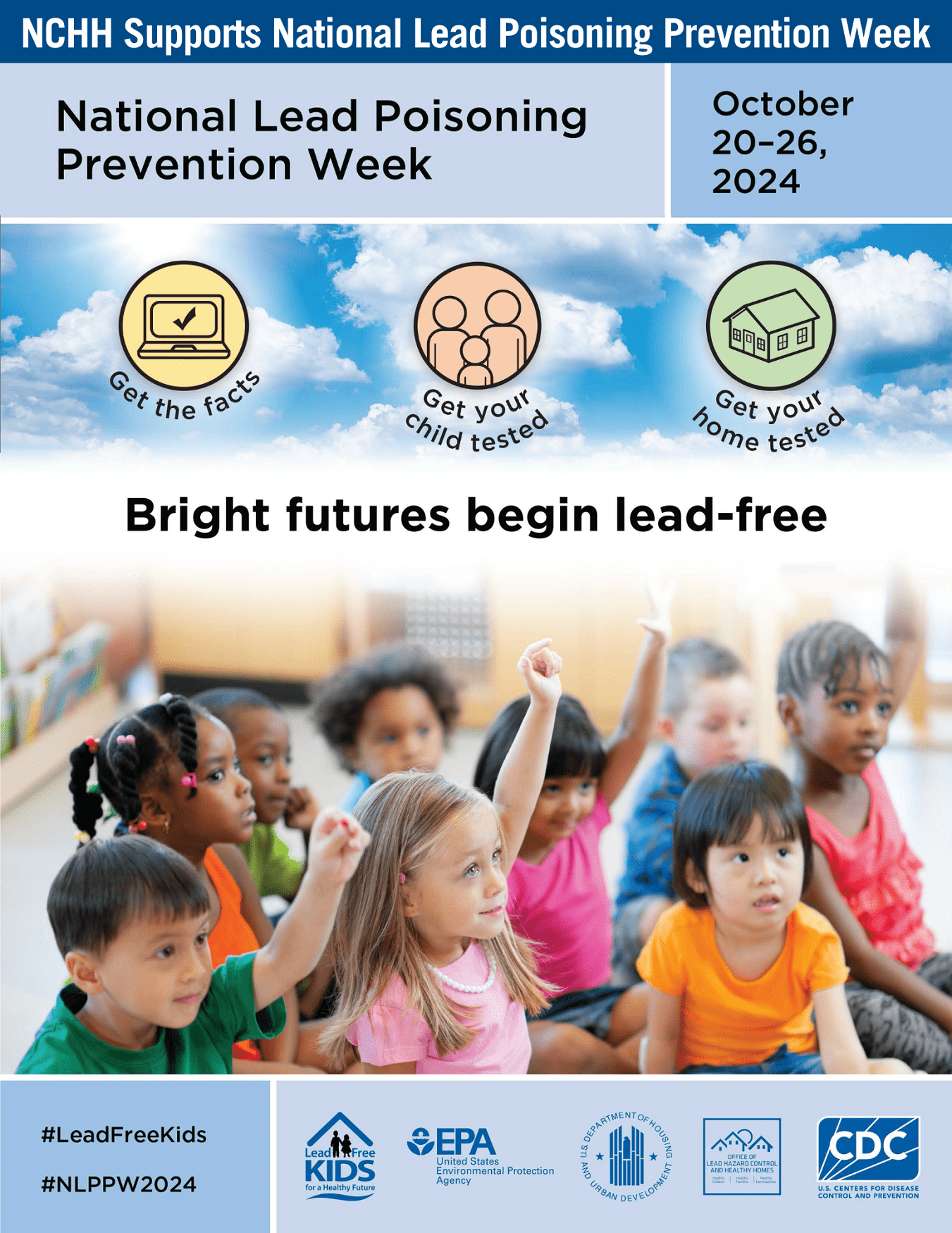NCHH Supports National Children’s Health Month and Lead Poisoning Prevention Week – October 20-26, 2022
Media Contact: Christopher Bloom, cbloom@nchh.org
 COLUMBIA, MD (October 1, 2024) — This October, National Center for Healthy Housing is pleased to support National Children’s Health Month and National Lead Poisoning Prevention Week, observed the last full week of the month (October 20-26, 2024).
COLUMBIA, MD (October 1, 2024) — This October, National Center for Healthy Housing is pleased to support National Children’s Health Month and National Lead Poisoning Prevention Week, observed the last full week of the month (October 20-26, 2024).
National Children’s Health Month
Because children are still growing, they are often more vulnerable to pollutants than adults, which can lead to greater exposure to and more severe effects from environmental hazards.
Said Administrator Michael S. Regan in EPA’s press release, “Every child deserves to breathe clean air, drink clean water, and live in healthy, thriving neighborhoods. [W]e are committed to making this a reality by advancing policies that reduce health disparities, and ensure that communities have the tools to safeguard their children’s future and lifelong health.”
National Children’s Health Month recommends immunizing against disease, encourages reduced screen time and outdoor play, and recommends healthier food choices and good oral care habits. It also supports education and advocacy relating to environmental health, such as protection against mold, pests, and lead hazards.
The various federal agencies will offer many resources and events over the course of the month, as will several state, local, and nonprofit organizations. One notable event comes courtesy of NCHH’s esteemed partner, the Children’s Environmental Health Network (CEHN): Their ninth annual Children’s Environmental Health Day (“CEHDay’) is Thursday, October 10. Their annual #CEHchat happens Wednesday, October 9. Register for CEHN’s chat here.
National Lead Poisoning Prevention Week
National Lead Poisoning Prevention Week is a joint initiative of the U.S. Department of Housing and Urban Development (HUD), the Centers for Disease Control and Prevention (CDC), and the U.S. Environmental Protection Agency (EPA). The goal is to encourage organized, local community events, and to empower families and other stakeholders to take action.
NCHH will host and participate in outreach and educational activities designed to raise awareness about the danger of lead exposure and poisoning and educate parents on how to reduce exposure to lead in their environment, prevent its serious health effects, and the importance of testing children for lead.
“While lead poisoning prevention is important every day, National Lead Poisoning Prevention Week provides an opportunity to reflect on why we do what we do, to highlight the work of our partners across the country, and to get others excited about joining the fight to end childhood lead exposure,” said Amanda Reddy, NCHH Executive Director.
Among the outreach activities and events planned for the week-long observance include NCHH’s seventh annual #NLPPWchat, scheduled for Wednesday, October 23, from 3:00 to 4:00 p.m. ET. The #NLPPWchat has grown significantly in popularity and reach since it debuted in 2017; the NCHH communications team looks forward to continued growth in 2024. (Registration for the 2024 #NLPPWchat will go live this week.)
About 3.3 million American households, including approximately 2.1 million households in lower-income communities, have children under six years of age who live in homes with lead exposure hazards. Even relatively low levels of lead exposure can impair a child’s cognitive development. Children with blood lead levels can experience delayed growth and development, permanent damage to the brain and nervous system, learning and behavior problems, and a host of other health-related problems. Public health actions are needed for these children. There is no safe blood lead level in children.
Lead can be found inside and outside the home, including in the water that travels through lead pipes or in the soil around the house; however, the most common source of exposure is from lead-based paint, which was used in many homes built before 1978. Adults and children can absorb toxic lead into their bodies by breathing in the lead dust (especially during activities such as renovations, repairs, or painting) or by swallowing lead dust that has settled on food or food preparation surfaces, floors, windowsills, and other places, or by ingesting paint chips or soil that contains lead.
Children can also become exposed to lead dust from adults’ jobs or hobbies, and from some metal toys or toys painted with lead-based paint. Children are not exposed equally to lead, nor do they suffer its consequences in the same way. These disparities unduly burden minority families, families residing in lower-income communities, and the communities themselves..
Lead exposure is largely preventable with increased testing, education, and a focus on prevention. Stakeholders can use HUD’s digital toolkit to assist with building awareness and implementation at the local level. One of the most valuable resources to help residents and housing professionals nationwide is the National Lead Information Center at 1-800-424-LEAD (5323).
“Lead poisoning is a problem we can solve,” stresses Ms. Reddy. “We can eliminate unnecessary lead exposures, but only if we commit to looking at lead exposure holistically and to implementing comprehensive solutions that address the entire range of exposures within a given community.”
For more information on National Lead Poisoning Prevention Week 2024, including quick links to official agency resources, registration for the 2024 #NLPPWchat, additional NCHH and partner materials, and upcoming related events, please visit NCHH’s dedicated National Lead Poisoning Prevention Week resource page.
###
About the National Center for Healthy Housing The National Center for Healthy Housing (NCHH) is a leading national nonprofit dedicated to transforming lives by transforming housing. Since 1992, NCHH has served as a highly regarded and credible change agent, successfully integrating healthy housing advocacy, research, and capacity building under one roof to reduce health disparities nationwide. Follow NCHH on X (formerly Twitter: @NCHH), Instagram (@nchhorg), Threads (@nchhorg), Bluesky (@nchh), or LinkedIn, become a fan on Facebook, or subscribe to NCHH’s YouTube channel.
